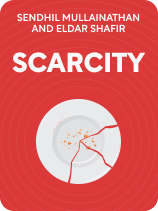

This article is an excerpt from the Shortform book guide to "Scarcity" by Sendhil Mullainathan and Eldar Shafir. Shortform has the world's best summaries and analyses of books you should be reading.
Like this article? Sign up for a free trial here.
What are the consequences of a lack of money? How does an insufficiency of financial resources affect other areas of one’s life?
A scarcity of financial resources has overarching consequences for our whole lives. In their book Scarcity, behavioral science researchers Sendhil Mullainathan and Eldar Shafir highlight five areas most affected by financial scarcity: health, parenting, memory, work productivity, and sleep.
Here’s a look at the effects of financial scarcity, according to Mullainathan and Shafir.
Financial Scarcity Has Wide–Reaching Impacts
Money is the one thing that controls all of our other resources, so it impacts every aspect of our lives. The authors explain that the domino effect of financial scarcity contributes to worse outcomes for poor people in terms of health, parenting, memory, work productivity, and sleep. They support this argument with evidence showing that when scarcity of money is eliminated, the cognitive capacity of people increases. Mullainathan and Shafir emphasize that problems relating to these areas stem from the bandwidth shortage caused by poverty rather than a lack of education or competence.
(Shortform note: Because these metrics are complex and overlapping, it’s likely that many interconnected factors contribute to worse outcomes in poor populations. For example, communities of color disproportionately experience poverty, and researchers attribute poor health outcomes in these communities to institutionalized racism and other forms of discrimination, language barriers, and low access to healthy food, quality education, and health insurance, among many other factors. Therefore, it’s difficult to isolate poverty and the depletion of mental bandwidth from other intersecting root causes.)
Health
In the context of health, for example, the authors write that poor people are much less likely to take their medications regularly. Although the medicine might be very important, Mullainathan and Shafir claim that it tends to fall outside of the scarcity-induced narrow focus. This leads to more severe illness even for conditions that are highly treatable, such as high blood pressure.
(Shortform note: Mullainathan and Shafir don’t specify if this problem applies to all illnesses, but based on their argument we can infer that the bandwidth shortage causes poor people to neglect medications for chronic illnesses with long-term consequences. It’s much harder to ignore conditions with immediate consequences for not taking medication, like asthma, although these conditions might also contribute to lower mental bandwidth for other things.)
Parenting
Mullainathan and Shafir argue that meeting common standards for good parenting (like providing consistent rules and connecting with children) are all much more difficult for a poor parent hyper-focused on making scarce resources stretch. They require mental bandwidth to manage numerous areas and make complex strategic decisions.
For example, after working long hours, a parent might have to juggle preparing dinner, cleaning, making sure homework gets done, enforcing disciplinary rules, resolving conflicts between their children, trying to spend quality time with their family, and planning logistics for the next day—all while the parent is focused on making ends meet to cover basic expenses. Mullainathan and Shafir also point out that poor parents can’t use money to ease their workload by hiring tutors or childcare providers.
(Shortform note: On the flip side of this example, Malcolm Gladwell explains in David and Goliath why having too much money also makes parenting harder. He writes that money only makes parenting easier up to a point. If you have enough money to buy most of the things your children ask you for, you have to be able to say that you won’t (rather than can’t) buy them something. To avoid making your children dependent on you, you have to deny them some things they want, and this requires establishing clear values and communicating them to your kids.)
Memory
People living in poverty also struggle to remember things like paying bills on time or keeping track of appointments. This leads to penalties such as late fees, making it even more difficult for people to pay their bills. Mullainathan and Shafir also write that late fees have more severe consequences for poor people—it might take away from the monthly grocery budget for a low-income person as opposed to being a negligible expense for a wealthy person. They argue that poverty not only increases the stakes for missing a payment but also makes people more likely to forget something like this due to their bandwidth shortage.
(Shortform note: Research reveals that the top reason for missing a credit card payment is forgetting about it, but it’s unclear if that primarily includes people struggling financially. Although one solution is to use auto-pay settings to avoid forgetting a payment, poor people would still be more vulnerable to other fees, like overdraft fees (incurred by withdrawing more than their available balance) or dropping below the minimum bank account balance.)
Work Productivity
Mullainathan and Shafir also claim that poverty decreases working memory (our ability to keep track of several tasks and process information). This then impacts poor people’s ability to be productive at work. For example, retail workers have to be able to ring up orders, watch out for shoplifting, and be friendly and engaging with customers, all while they’re in a heavily burdened mental state.
(Shortform note: Many people argue that because our working memory is limited, we should minimize multitasking at work—no matter our income level. Gary Keller asserts in The One Thing that multitasking reduces our effectiveness, increases stress, skews our sense of how long it takes to do things, and wastes time as we shift between different tasks. However, some people might have less control over how they do their work if they’re a lower-ranked employee or work in the service industry, which often requires multitasking.)
Sleep
Mullainathan and Shafir write that poverty also impacts sleep because being preoccupied with financial instability depletes the amount and quality of sleep that poor people get. The effects of sleep deprivation accumulate over time and chip away at peoples’ already depleted mental bandwidth. This then negatively impacts all the other areas discussed in this section, like parenting and work, as well as safety issues like driving.
(Shortform note: Walker explains in Why We Sleep that sleep deprivation also puts people at higher risk for health problems such as heart disease, diabetes, obesity, cancer, and disruptions to hormone levels and immunity. In terms of driving safety, Walker reports that getting less than five hours of sleep causes the same cognitive impairment as being legally drunk.)

———End of Preview———
Like what you just read? Read the rest of the world's best book summary and analysis of Sendhil Mullainathan and Eldar Shafir's "Scarcity" at Shortform.
Here's what you'll find in our full Scarcity summary:
- An exploration of the good and bad sides of a scarcity mindset
- Strategies to counteract the negative cognitive effects of scarcity
- How policymakers should redesign social programs






